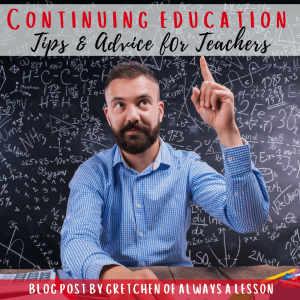Continuing Education Tips & Advice
Continuing education is one way to ensure teachers and leaders remain up-to-date on best practices for their respective roles. As a result, many educators become reinvigorated as they connect with other professionals, swap strategies, and gain new ideas. But most importantly, continuing education ensures educators renew their license and certificates.
 What is continuing education?
What is continuing education?
It is credits educators earn from professional development [PD] they attend. Each license will dictate what type of professional development topics and amount of hours needed to renew the certificate. These requirements are usually annually based. Check your state licensing website for details.
How do I engage in continuing education opportunities?
If you are school based, someone on site will handle this for you. Each PD you attend will be tracked and entered on your behalf. However, if you are not school based, you’ll need to pay close attention to the date of your license renewal, and attend PD on your own accord. You’ll submit your PD certificates as proof of hours of learning towards your license to your state. For example, as an educational consultant, I had to locate my own PD and pay for it. I then submitted paperwork showing credits earned for each PD to North Carolina Department of Public Instruction (NCDPI). My license was then renewed.
(Tip: I have created virtual PD opportunities that you can attend and submit course completion forms to your district/state. Browse those here.)
Should I get another certificate or degree?
This is a personal decision and one that is a great discussion between your supervisor and yourself. Some districts pay educators more for additional license and/or certificates so check your district website for details. (And sometimes they even cover the fees to obtain the certificate or degree.)
Educators may decide to pursue continuing education even if their district doesn’t cover the costs or provide an increase in salary. The benefit of doing this would be that if you ever choose to teach in a different district, they may offer perks for the additional certificate or degree. Additionally, the course work required for those counts as PD credit towards your license, keeping you in good standing.
What should I go back to school for?
There are a few things to consider when deciding what PD you will attend or what certificate/degree you want to pursue.
- What are you passionate about?
- What is your ideal role in education?
- What topics/areas are you weakest in?
- What looks or sounds interesting to you?
- What are current or future initiatives at your state, district or school?
- What recommendations does your supervisor make for you specifically?
You not only want to be up-to-date in best practices for your current role, but you want to set yourself up for success with whatever comes next for you. For example, I attended PD to meet requirements by my district but I pursued my master’s degree in Curriculum and Instruction because I knew I wanted to move into teacher leadership at some point and obtained my National Board certification twice as an Early Childhood generalist since I mainly supported elementary educators.
Next Steps
No matter what you decide to do, follow these tips for maximum results:
- Engage fully in the experience– don’t shortchange yourself by going through the motions because what you put in is what you will get out of it
- Connect with others– much of what I gained is not from the PD itself, but from the people in it with me because their wisdom and advice is unmatched (and who doesn’t want to make friends?)
- Track your learning – even if your school or district is tracking your PD, it is always a good idea to keep your own records just in case (especially pay attention to the expiration dates!)
GO BE GREAT!

